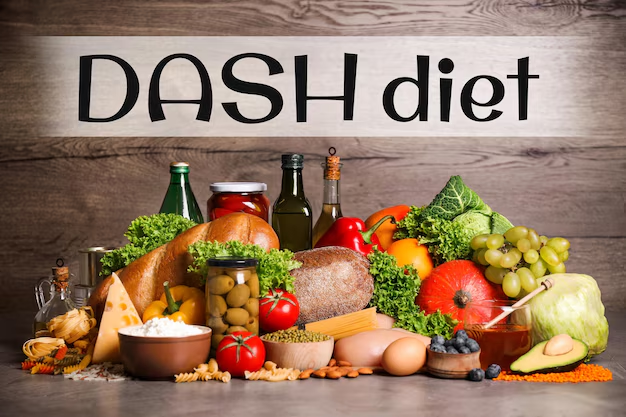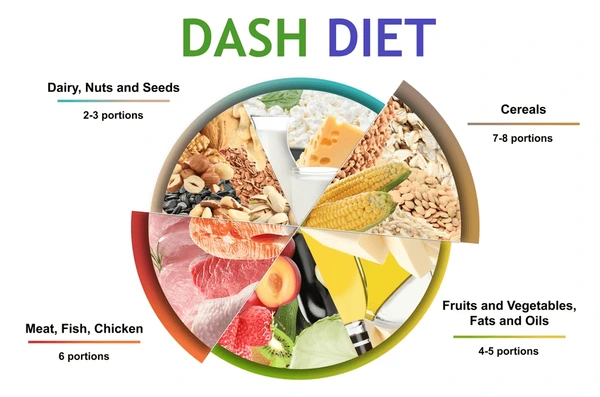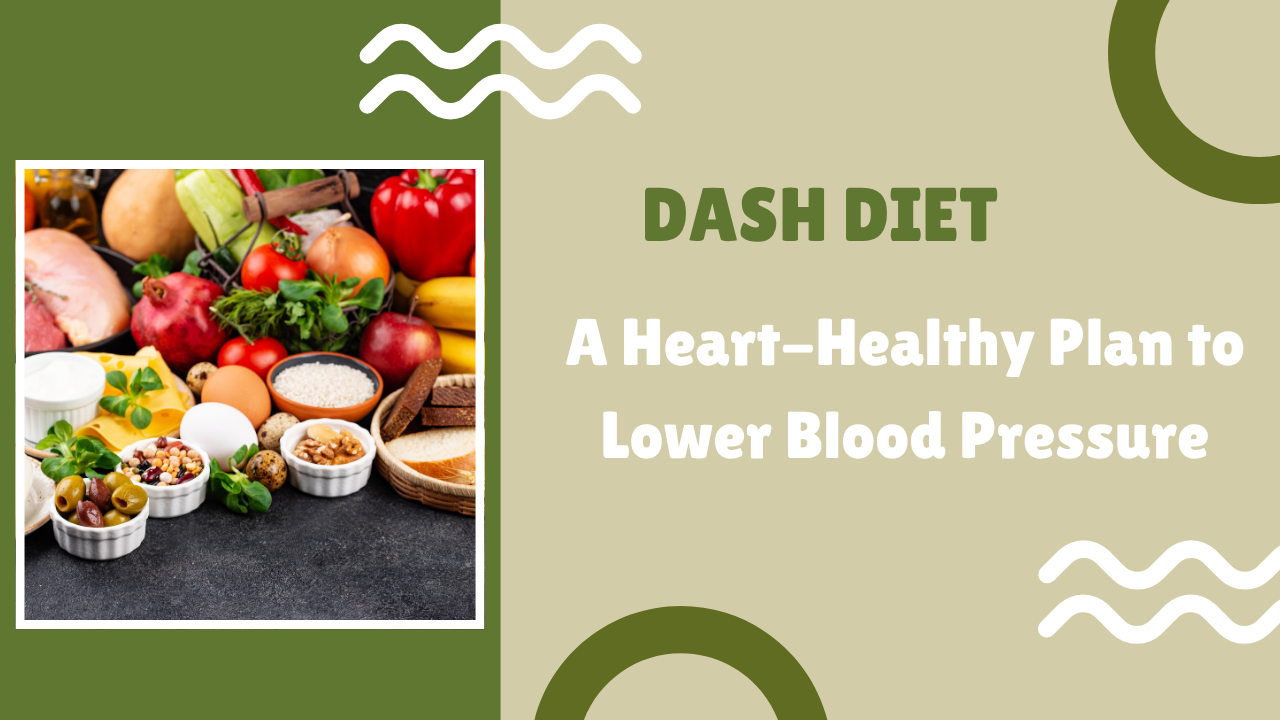High blood pressure, or hypertension, is a common condition affecting millions globally. It increases the risk of serious health issues, such as heart disease, stroke, and kidney failure. Managing blood pressure is essential for reducing these risks and improving overall health.
The DASH diet, developed by the National Institutes of Health (NIH) in the 1990s, offers a dietary strategy to help combat high blood pressure. Unlike temporary fad diets, the DASH diet focuses on a long-term approach to nutrition, promoting a balanced and nutrient-rich eating pattern.
The DASH diet encourages the consumption of whole grains, fruits, vegetables, lean proteins, and low-fat dairy. It also limits salt, added sugars, and unhealthy fats. By following this eating plan, individuals can manage their blood pressure, improve heart health, and reduce the risk of other chronic conditions. The DASH diet is a sustainable and effective choice for better cardiovascular health.
What Is the DASH Diet ?

The DASH diet emphasizes the importance of consuming foods that are rich in potassium, calcium, magnesium, fiber, and lean proteins. These nutrients are essential for maintaining healthy blood pressure and overall heart health. By focusing on these foods, the diet promotes better cardiovascular wellness.
It also encourages the intake of fruits, vegetables, whole grains, and low-fat dairy products. These foods provide a balanced mix of nutrients that support the body’s vital functions. Lean proteins such as poultry, fish, and legumes are also recommended to help maintain muscle and tissue health.
The DASH diet limits the intake of sodium, saturated fats, and added sugars. By reducing these unhealthy components, the diet helps lower the risk of high blood pressure, heart disease, and other chronic conditions. It’s a sustainable approach to healthier living with long-term benefits for the heart.
It encourages the intake of:
Fruits and Vegetables: These are high in essential nutrients and fiber.
Whole Grains: Sources like whole wheat, oats, and brown rice provide fiber and B vitamins.
Lean Proteins: Includes poultry, fish, beans, and nuts.
Low-Fat Dairy: Such as skim milk and low-fat yogurt for calcium and protein.
Nuts, Seeds, and Legumes: Provide healthy fats and proteins.
Diet limits:
Sodium: Recommended intake is less than 2,300 mg per day, ideally aiming for 1,500 mg for greater blood pressure reduction.
Saturated and Trans Fats: Found in fatty cuts of meat, full-fat dairy, and processed foods.
Added Sugars: Common in sugary beverages, sweets, and processed snacks.
Scientific Evidence Supporting the DASH Diet
Blood Pressure Reduction

Numerous studies have demonstrated the effectiveness of the DASH diet in lowering blood pressure. A landmark study published in The New England Journal of Medicine found that the DASH diet reduced systolic blood pressure by an average of 5.5 mm Hg and diastolic pressure by 3.0 mm Hg more than a typical American diet. For individuals with hypertension, the reductions were even more significant.
A systematic review and meta-analysis confirmed that adherence to this special diet leads to significant reductions in both systolic and diastolic blood pressure, regardless of baseline blood pressure levels.
Cardiovascular and Metabolic Health
Beyond blood pressure, the DASH diet has been associated with improved cholesterol levels, reduced risk of stroke, and better weight management. It also supports metabolic health by improving insulin sensitivity and reducing inflammation.
Cultural Adaptability
The DASH diet’s emphasis on whole, unprocessed foods makes it adaptable to various cultural cuisines. For instance, in South Asian populations, high adherence to this special diet was linked to a 67% lower risk of developing hypertension over five years.
Top 8 Dash Diet
Fruits: The DASH Diet recommends consuming 4-5 servings of fruits daily. Fruits like berries, oranges, apples, and bananas are rich in essential vitamins, minerals, and fiber, which support overall health and help lower blood pressure.
Vegetables: Aiming for 4-5 servings of vegetables per day is important in the DASH Diet. Vegetables like leafy greens, carrots, broccoli, and bell peppers are low in calories but high in nutrients such as potassium, magnesium, and fiber, which are key for heart health.
Whole Grains: The DASH Diet suggests 6-8 servings of whole grains each day. Whole grains like brown rice, quinoa, oats, and whole-wheat bread provide fiber, which helps with digestion, stabilizes blood sugar, and supports heart health.

Lean Proteins: Consuming 2 or fewer servings of lean proteins per day is recommended on the DASH Diet. Sources include poultry, fish, beans, and nuts. These proteins are lower in saturated fat compared to red meats, helping to reduce the risk of heart disease.
Low-Fat Dairy: The DASH Diet emphasizes 2-3 servings of low-fat dairy products per day, such as milk, yogurt, and cheese. These provide calcium and vitamin D, which are essential for bone and heart health, but with less saturated fat than full-fat versions.
Nuts, Seeds, and Legumes: The DASH Diet encourages 4-5 servings of nuts, seeds, and legumes each week. These foods are good sources of plant-based protein, healthy fats, and fiber, all of which are beneficial for heart health and lowering blood pressure.
Healthy Fats: The DASH Diet recommends limiting unhealthy fats and focusing on healthier fats. Aim for 2-3 servings of healthy fats per day, such as olive oil, avocado, and fatty fish like salmon. These fats can help lower cholesterol and improve heart function.
Sweets: On the DASH Diet, sweets should be limited to 5 servings per week. It’s best to choose healthier alternatives, like fruit or low-fat treats, to satisfy sugar cravings without overloading on empty calories or refined sugars.
Sodium: A key aspect of the DASH Diet is reducing sodium intake. The general recommendation is to limit sodium to 2,300 mg per day, or 1,500 mg for those aiming for optimal heart health. Reducing sodium helps lower blood pressure and reduce the risk of heart disease.
Alcohol: If you drink alcohol, the DASH Diet advises moderation—1 drink per day for women and 2 drinks per day for men. Excessive alcohol can raise blood pressure and contribute to other health issues, so keeping it moderate is key for maintaining heart health.
DASH Diet vs. Other Diets
| Feature | DASH Diet | Mediterranean Diet | Keto Diet | Paleo Diet |
|---|---|---|---|---|
| Focus | Lower blood pressure and heart health | Heart health and longevity | Weight loss and metabolic health | Ancestral eating patterns |
| Carbs | Moderate | Moderate | Very low | Moderate to low |
| Fats | Low saturated fat | Healthy fats like olive oil | High fat | Moderate fat |
| Protein | Lean meats, fish, legumes | Fish, legumes, moderate meat | High | High (from meat and nuts) |
| Scientific Evidence | Strong | Strong | Mixed | Limited |
Long-Term Health Benefits of the DASH Diet

1. Reduced Risk of Cardiovascular Disease
The DASH diet significantly lowers LDL (“bad”) cholesterol and blood pressure, two major risk factors for heart disease and stroke.
A 2021 meta-analysis showed that this special diet diet reduced the risk of coronary heart disease by up to 20%.
2. Improved Kidney Health
The reduced sodium and increased potassium intake can slow the progression of chronic kidney disease (CKD).
It also helps protect against kidney stones due to the diet’s alkalizing effect and balanced calcium intake.
3. Better Bone Health
High calcium, potassium, and magnesium intakes contribute to better bone mineral density and reduced osteoporosis risk, especially in older adults.
4. Reduced Cancer Risk
A diet rich in plant-based foods, antioxidants, and fiber is associated with a lower risk of certain cancers, including colorectal and breast cancer.
5. Cognitive Benefits
Emerging research links DASH and similar diets with improved cognitive performance and lower risk of Alzheimer’s disease.
Who Should Follow the DASH Diet ?
The DASH diet is suitable for:
People with High Blood Pressure: The core goal of the DASH Diet is to reduce hypertension, or high blood pressure. By focusing on foods rich in potassium, magnesium, and fiber, such as fruits, vegetables, and whole grains, this diet helps relax blood vessels and lower blood pressure levels. It limits sodium intake, which is a key factor in managing high blood pressure, making it an effective long-term strategy for individuals seeking to control or prevent hypertension.
Those with a Family History of Heart Disease: For individuals with a family history of heart disease, the DASH Diet can significantly reduce the risk of developing heart-related problems. By emphasizing heart-healthy foods like lean proteins, whole grains, and healthy fats, the diet helps lower cholesterol levels, reduce inflammation, and maintain a healthy weight. This approach addresses key risk factors, such as high blood pressure and elevated cholesterol, which are commonly linked to heart disease.
Individuals with Diabetes or Metabolic Syndrome: The DASH Diet is beneficial for individuals with diabetes or metabolic syndrome, as it helps improve insulin sensitivity and promotes more stable blood sugar levels. The diet emphasizes whole, unprocessed foods with a low glycemic index, which means it supports healthy blood sugar control. By reducing the intake of refined sugars and unhealthy fats, it helps manage weight, improve insulin function, and lower the risk of type 2 diabetes.
Anyone Seeking a Balanced, Sustainable Eating Pattern: The DASH Diet is not a restrictive fad diet but rather a balanced, sustainable eating plan. Unlike diets that eliminate entire food groups or severely restrict calorie intake, the DASH Diet promotes a healthy relationship with food, allowing individuals to enjoy a variety of nutrient-dense foods. Its flexibility and focus on whole, minimally processed foods make it a practical and enjoyable long-term approach to maintaining overall health and wellness.
Conclusion

The DASH diet is more than just a meal plan—it’s a science-backed approach to achieving and maintaining better health, especially for individuals dealing with high blood pressure or those aiming to prevent cardiovascular disease. By emphasizing whole foods like fruits, vegetables, lean proteins, and whole grains while reducing sodium and processed items, the DASH diet provides a balanced and sustainable path to improved wellness.
Adopting the DASH diet may require some initial adjustments, but its long-term benefits far outweigh the challenges. Whether your goal is to lower blood pressure, manage weight, or simply eat healthier, this diet offers practical and flexible solutions that fit into most lifestyles and cultural preferences. With gradual changes and consistent effort, it’s possible to see significant improvements in your health markers.
Ultimately, the DASH diet stands out as one of the most effective and well-researched dietary approaches available. It promotes heart health, supports metabolic function, and fosters overall well-being for people of all ages.
FAQs
1. What does “DASH” stand for in the DASH diet ?
DASH stands for Dietary Approaches to Stop Hypertension. It’s a diet specifically designed to help prevent and lower high blood pressure. It emphasizes nutrient-rich foods like fruits, vegetables, whole grains, lean protein, and low-fat dairy while reducing sodium, saturated fat, and added sugars.
2. How quickly can the DASH diet lower blood pressure ?
Many people see noticeable reductions in blood pressure within 2 to 4 weeks of following the DASH diet, especially when sodium intake is also reduced. For some, improvements can occur even sooner, depending on lifestyle and adherence.
3. Can I lose weight on the DASH diet ?
Yes. Although the DASH diet is not specifically a weight-loss diet, many people lose weight naturally by cutting back on processed foods and eating nutrient-dense meals. Pairing the DASH diet with physical activity can enhance weight loss.
4. Is the DASH diet suitable for people with diabetes ?
Absolutely. The DASH diet helps stabilize blood sugar levels, reduce insulin resistance, and promote overall metabolic health. Its focus on whole foods and high fiber makes it a great choice for people with type 2 diabetes or prediabetes.
5. How much sodium is allowed on the DASH diet ?
The standard DASH diet recommends less than 2,300 mg of sodium per day, with an ideal target of 1,500 mg for individuals with hypertension or those seeking greater heart health benefits. Reading food labels and cooking at home can help manage sodium intake effectively.



